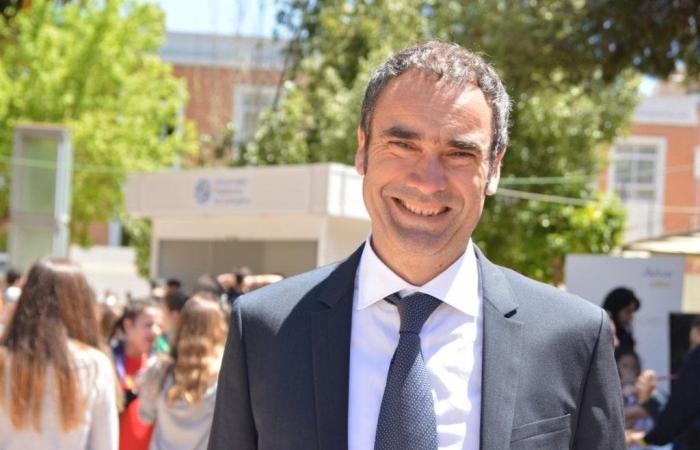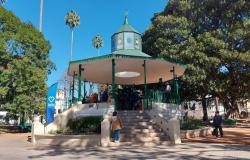Not everyone has the ability to make science accessible to laymen, but José Luis Serrano does. Chemist by vocation, professor at the Polytechnic University of Cartagena (UPCT) and researcher, Serrano (Valencia, 1970), is also dedicated to dissemination … scientist participating in various national and international projects. What Serrano is also passionate about, almost as much or more than chemistry, is music, and after spending several years recording and performing as Remo Persutti, he has now returned to Higinio, his usual group. Who said chemistry was boring?
–The anchovies in the appetizer are cold cooked through the acid of the vinegar. Pure chemistry.
–Vinegar is very useful and has always been used to preserve food. Among other things, I work with acetic acid, which is vinegar, and a lot of that research has to do with reacting it with palladium. In fact, this is how we have achieved a catalyst to synthesize new antiviral drugs.
–Did you play Quimicefa when you were little?
–Yes, I have always really liked chemistry. When I finished my degree, I had a moment of crisis because I didn’t know exactly what jobs a chemist did, and when I saw them I wasn’t very sure that I would like them. But what I have always liked is teaching and studying chemistry, I never get tired of doing it. I go to the laboratory on many Fridays, I put on music there and then I relax and dedicate myself to research. It’s like cooking, right?
–Traditionally, the sciences and humanities have been watertight compartments. Does that division still exist?
–Yes, although there are already many projects that tend to combine science, technology and humanities. For example, the UPCT has a European alliance with eight other polytechnic universities, an alliance that aims for technology, engineering and architecture professionals to keep in mind the humanistic part, mixing ethics and technology, or aesthetics, as a philosophical movement, and technology.
–Does research in Spain still mean crying?
–If you look at the numbers, the investment is still poor. It has been very difficult to return to pre-crisis and pre-pandemic levels because, in times of crisis, what has always been done here is to cut back. It is a complicated issue, although there are currently many very interesting talent recovery programs and scholarships. And I have the impression that people are very trained, more than we could be trained before, but job stabilization continues to be very difficult for them.
–But, since the pandemic, scientific work has had greater recognition, especially due to the speed with which vaccines appeared.
–That was amazing. As a scientist, I was excited because the times of science are very slow, but the urgency greatly improved communication between people from different parts of the world who came together to collaborate on a common goal. Achieving results in such a short time had not been done before, but that speed has given rise to several lawsuits because some of the vaccines had side effects.
–With the rise of denialism, scientific dissemination is essential.
–Of course, but, probably, this denialism is linked to the discredit of science. Before, in general, science had a prestige; Now, many invalidate it depending on what the scientist says: if he tells them what they want to hear, everything is great, but, if not, they say no, that guy is paid by I don’t know who. And in that hubbub we all lose, which is why scientific dissemination is more important than ever. But we also have to be self-critical, because there are people in science who have done strange things, and it is true that, surely, there has been a crisis of honesty. Everyone is partly to blame.
Women in science
–There are more and more women in science careers.
–Yes, we notice it in the different engineering. We had a pilot project that was carried out in five universities in Spain and was called ‘I want to be an engineer’. In addition, I spent two or three years organizing summer camps in which students from all over the country were selected, strictly based on grades in Physics, Chemistry, Mathematics and Drawing. Four shifts of thirty people came, and none of them brought less than twenty girls. But then, curiously, the majority of them did not opt for engineering or technology careers, but instead went into medicine and healthcare careers. So there is still a way to go.
–You were part of ‘Bloopbusters’, a group of scientists dedicated to hunting bloopers in the movies. What is the biggest nonsense you have seen in a movie?
–I love one from the fourth installment of Indiana Jones. There is a nuclear explosion, Indy goes into a refrigerator because he has a sign that says it is covered in lead, the refrigerator flies away and he survives the explosion. And yes, lead protects from radiation, but not from a nuclear explosion, of course.
–And the film most faithful to science?
–’Interstellar’ is very good. And no chemist would be allowed to finish his degree without watching ‘Breaking Bad’. Many things come out that are very good.






